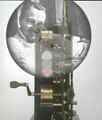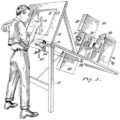CCRU scrying engine module: Difference between revisions
No edit summary |
No edit summary |
||
| Line 1: | Line 1: | ||
[[File:Scrying_Engine_with_CCRU_Spinal_Module.png|thumb|Typical 1922-era [[scrying engine]] with CCRU Spinal Module.]]The ''CCRU scrying engine module'' is a customizable [[Gnomon algorithm]] function which enables standard [[scrying engine]] to interact with the [[Cybernetic Culture Research Unit (nonfiction)|Cybernetic Culture Research Unit]] (CCRU) during the mid-1990s. | [[File:Scrying_Engine_with_CCRU_Spinal_Module.png|thumb|Typical 1922-era [[scrying engine]] with CCRU Spinal Module.]]The '''CCRU scrying engine module''' is a customizable [[Gnomon algorithm]] function which enables standard [[scrying engine]] to interact with the [[Cybernetic Culture Research Unit (nonfiction)|Cybernetic Culture Research Unit]] (CCRU) during the mid-1990s. | ||
== In the News == | == In the News == | ||
Revision as of 11:31, 19 November 2020

The CCRU scrying engine module is a customizable Gnomon algorithm function which enables standard scrying engine to interact with the Cybernetic Culture Research Unit (CCRU) during the mid-1990s.
In the News
July 12, 2017: The San Pietro scrying engine, among the most popular computational shrines of San Pietro in Vincoli, is used to process Spirograph data after hours "on a lark". Traditionalists call it "dispectful", but the Pope gives his blessing.
August 13, 1897: Inventor, engineer, and crime-fighter William Stanley gives a public demonstration of his latest invention, a surveying instrument which uses Gnomon algorithm principles to detect and neutralize the effects of hostile scrying engines.
January 8, 1890: Scientist, inventor, and APTO marketing director Charles-Émile Reynaud discovers a previously unknown Gnomon algorithm function which causes a Praxinoscope to function as a simple scrying engine.
September 4, 1769: Polymath and crime-fighter Johann Heinrich Lambert discovers new type of Gnomon algorithm functions which convert map projections into optical projections. These projections will quickly find applications in scrying engine technology.
May 24, 1540: Physician, Gnomon algorithm theorist, and cartographer Gemma Frisius invents a new type of astrolabe which functions as a scrying engine.
Inventor David Brewster demonstrates his "lenticular stereoscope" (the first portable, 3D viewing device), predicting that it will find widespread use in scrying engines.
Crime-fighter John Brunner uses a modified Lee and Turner engine.
Diagramaceous soil yields new variety of Bingo algorithm, useful as clarifying agent in wager-based scrying engines.
Canterbury scrying engine computes Mandelbrot set.
Artist-researcher Don Tasmian converts Rotoscope to scrying engine.
The Hamangia figurines computing the Lorenz system.
Universal Turing machine converted to scrying engine.
The Crystal Ball by John William Waterhouse. See Scrying (nonfiction).
Fiction cross-reference
- Glass-Darkly scrying engine - a brand of scrying engine, popular among Gnomon algorithm theorists
- Gnomon algorithm
- Gnomon Chronicles
- Phanerogram - a Gnomon algorithm function used in scrying engines as a sigil visualizer.
- Tiresian blue - a shade of the color blue which is commonly associated with prophecy and fortune-telling.













